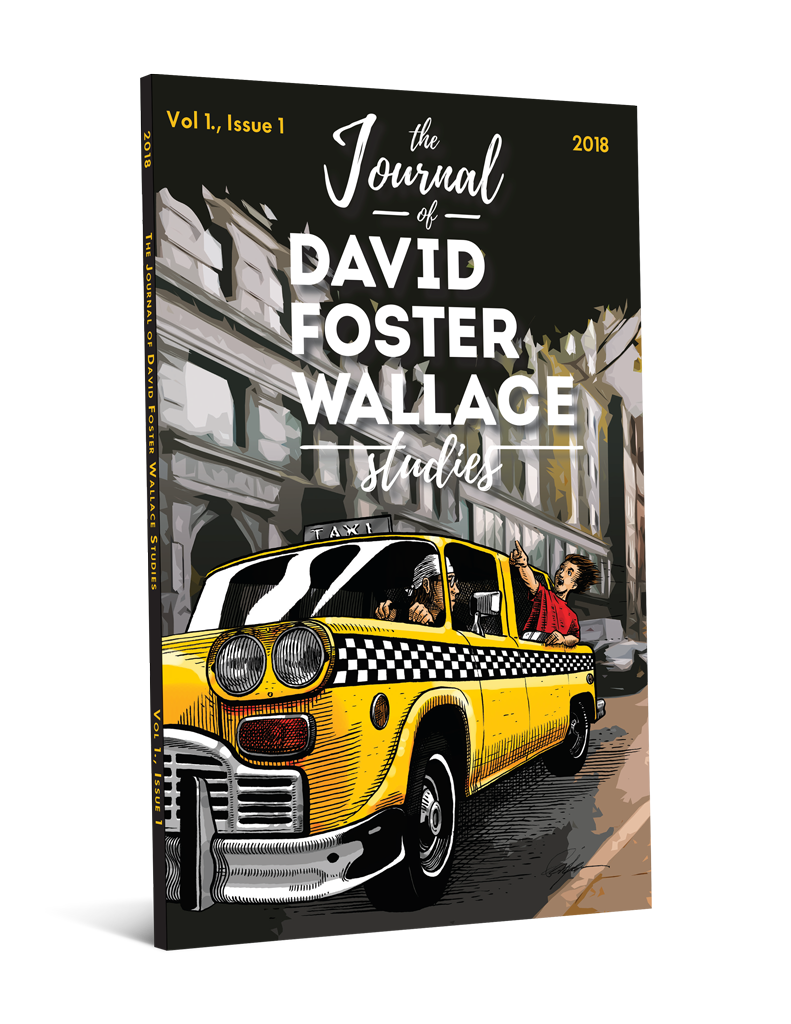
As you may have noticed from Twitter, Instagram, or some other form of social media about which Wallace definitely would have had something to say, the first issue of the first volume of The Journal of David Foster Wallace Studies has begun circulation. You may have already received your copy, or it may be on its way. If you haven’t gotten your copy yet, hang tight; you will. If you’re international, you may need to hang tight a bit longer than those of us stateside—it takes a while to cross those oceans!
In this post, you’ll find a letter from journal managing editor Tony McMahon. Within the journal itself, you’ll find an introductory letter from Editor-in-Chief Clare Hayes-Brady, as well as a preface from Lucas Thompson. But this letter from Tony is just another little introduction to the journal, and hopefully something to help those of us who haven’t yet received our copy not just about die of suspense. So think of this as your appetizer to the journal—something to hold you over until the main course gets there.
At the end of his letter, Tony suggests getting involved. If you’d like to know how to get more involved now or in the future, please email us at [email protected]. You can also go to dfwsociety.org, scroll all the way to the bottom, and type in your email where prompted. Once you click “Subscribe,” you’ll start getting our newsletters and updates. If you want to subscribe to the journal, click “Membership” on our website and follow those instructions.
There are lots of ways to get involved, and we are always looking for new projects, so don’t hesitate to reach out. We hope that you love the journal as much as we do. It has truly been a labor of love for everyone on this board.
LETTER FROM MANAGING EDITOR TONY McMAHON
Welcome to the first issue of The Journal of David Foster Wallace Studies. The why of this undertaking has been eloquently addressed in Lucas Thompson’s preface. So I guess the question, really, is how did we get here? I should acknowledge the countless unpaid hours of reviewing and copyediting by our enthusiastic and just world-shakingly awesome board members and volunteers. The tireless work of Matt Bucher, president of The International David Foster Wallace Society, can also not go unremarked. Nor can the infectious enthusiasm of the person who, arguably, started it all with his Howling Fantods website, Nick Maniatis.
But to really tell the story of how the publication you’re holding now came to pass, I’ll need to— paradoxically perhaps—step away from the Wallace’s directive to not see ourselves as the centre of the universe and talk about my favorite subject: myself. (Stick with me here. It’s all about Wallace in the end, I promise you.) I first discovered DFW as a grad student doing a creative writing PhD, and from about page 100 or so of Infinite Jest, I’d decided that there was no way this dude was not making it into my dissertation. I’d already kind of fallen in love with him during Dave Eggers’s introduction when I found out he was a sweater, an affliction I share. But the sheer crazy-brilliance of the prose, the size of the author’s brain, and the overwhelming generosity of the novel all attracted me in ways I hadn’t experienced in anything I’d ever read before. Here’s the main thing though: Wallace inspired me to be a better writer by illustrating for me my chosen craft’s worth, which sealed the deal. I’d found my guy.
Under the financial auspices of my university and the not-unpleasant influence of an elephantine dose of Valium, I boarded an airplane for the first time in 24 years to give a paper at Infinite Wallace in Paris. This was September 2014, and I was at that stage unsure of myself as an academic, to put it mildly. I could have used some more Valium the day I walked onto the stage at the Sorbonne, but I did want to be, you know, coherent. So I clenched so tightly that, had I farted, only a dog would have heard it, and proceeded to give a paper that disagreed with Wallace scholarship superstar Marshall Boswell. Did I mention that Boswell was seated only a few feet away?
Afterwards, as was in retrospect inevitable, Boswell approached me. I wasn’t sure how much more my already chiming nerves could take, but I put on a brave face. To my utter astonishment, Boswell told me, in the most pleasant manner imaginable, that he thought my paper was terrific, and agreed with me that he was wrong about Wallace’s lack of political engagement until The Pale King. It was then that I suspected I was onto something truly special with this whole Wallace Studies thing, despite the fact that no one was really calling it that back then. Here was a community of people—academics, no less—who were not at all interested in staking out territory, one-uppersonship, or outpublishing each other. The Paris conference as a whole was as congenial an experience as I’d ever had in my academic life up until that stage and remains so to this day. (The next year I did drive from Los Angeles to Normal, Illinois, for DFW15 in a Mustang convertible. That was pretty cool.)
But the point here is that the Wallace community is—not to put too fine a point on it—simply the best bunch of women and men in the world. When I speak to non-Wallace people about this, I invariably get the same response: There’s always a sense of camaraderie amongst people who are interested in the same thing. But they simply don’t get it. Stamp collectors and Updike aficionados are simply not the same hemisphere. As evidence, witness a recent email I sent to the copyeditors who worked on this very issue of the journal. As managing editor, I was looking for volunteers for the—let’s not sugar coat this—Not Exactly Glamorous task of picking academics up on their spelling mistakes. The response was phenomenal. Just about everyone in the email chain responded. People were crushed that time zones had messed with their chance to contribute however they could to what amounts to a small (albeit important, even if I do say so myself) part of Wallace scholarship. Can you even imagine that happening with another author? Of course it’s got to do with the nature of the things Wallace writes about: How to live meaningfully, civic virtue, what to do about depression and addiction.
This may be an odd thing to say while introducing an academic journal devoted to examining a writer’s work, but there’s something that I hope will always be nebulous about the way Wallace writes and the impact this has on our lives. Even more than this, I hope I will always be slightly baffled by the fact that my best friends mostly live in America, or that I travel there at least once a year to talk about Wallace. Cracking the code on the weird alchemy of why exactly the Wallace community is such an open-hearted one would somehow seem…sad to me. Figuring out how a thing works is not always the best way to keep on loving it.
When I finally submitted my PhD, my examiners said my chapter on Wallace was the best part of my completed novel/ thesis combination, but that it just didn’t fit. I was writing an Australian novel (whatever that might mean), and the exegetical component was in fact called “Writing and Healing in the Australian Novel.” What the hell was this American schmo doing here? They were right, naturally, but I couldn’t have cared less. Somewhere, on something called a research repository, I’m on record as having written about Wallace, the writer I consider the most important of the twentieth and twenty-first centuries. Even if my contribution isn’t earth shattering (it decidedly isn’t), that shit’s important. This journal, of course, is much more important, because there are contributions from Wallace scholars way more accomplished than I am. Like those eager beaver copyeditors, I’m thrilled to have played any part whatsoever. I don’t know, this feels like the start of something new for Wallace Studies, which is another way of saying the start of a new community.
I know you’re already here, but I just wanted to say come join us. By this I mean join us even more absorbedly than you might have thought you needed to: Attend a conference, submit an article, volunteer to become a copyeditor. It will pay off for you in ways you never imagined possible. Like Wallace’s Boston AA, I can’t for the life of me tell you how it works, but I can promise you with all my heart that it does.
Dr. Tony McMahon
Melbourne, 2018
